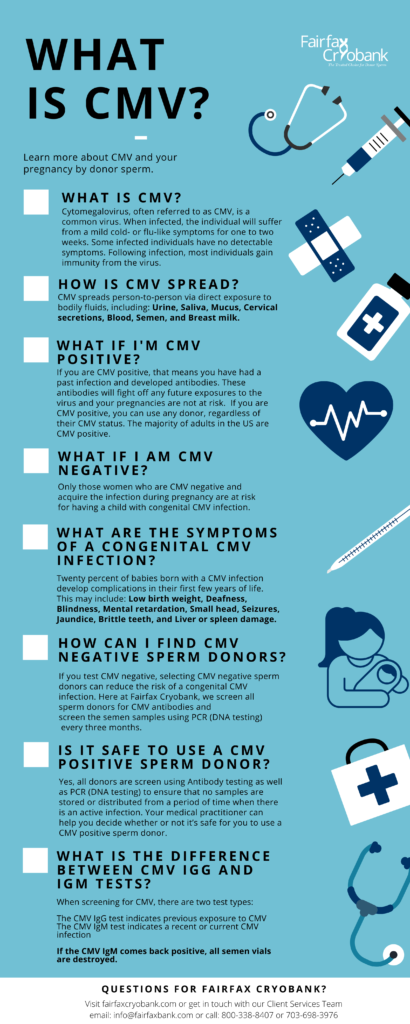CMV and Pregnancy
The safety of you and your child is of paramount importance. That’s why taking the time to understand the relationship between CMV and pregnancy is critical – especially if you are CMV negative.
We have compiled some of the most frequently asked questions about CMV below. Have a read, and if you have any further questions, please get in touch or consult your physician.
CMV FAQ
-
What is CMV?
Cytomegalovirus, often referred to as CMV, is a common virus in the same family as chickenpox and cold sores. When infected, the individual will suffer from mild cold- or flu-like symptoms for one to two weeks. Some infected individuals have no detectable symptoms. Following infection, most individuals gain immunity from the virus.
Between 50 and 85 percent of American adults have been exposed to CMV, with the majority of cases occurring in childhood – these individuals will test CMV positive. If you test CMV negative, it’s essential to select CMV negative sperm donors, as CMV can transmit via bodily fluids, such as semen.
If someone who is pregnant contracts CMV, the virus puts the unborn child at risk of severe medical issues, including intellectual disability, deafness, and seizures.
No vaccination for CMV currently exists.
-
How is CMV spread?
CMV spreads person-to-person via direct exposure to bodily fluids, including:
- Urine
- Saliva
- Mucus
- Cervical secretions
- Blood
- Semen
- Breast milk
Daycare centers are one of the most common exposure settings for children. For adults, unprotected sexual activity is a typical cause of infection. An infected mother can transmit CMV to her fetus via the placenta or cervical secretions during birth.
-
What are the symptoms of CMV?
Symptoms of CMV are typically mild, non-specific, and hard to identify. Many adults do not even realize they have an infection. Detectable symptoms may include:
- Swollen lymph nodes
- Tiredness
- Runny nose
- Other flu-like symptoms
People with impaired immune symptoms may suffer from more severe symptoms when infected with CMV.
-
What are the symptoms of a congenital CMV infection?
If a CMV negative woman becomes infected during pregnancy, the fetus could become infected, too. This is known as a congenital infection and occurs in about one-third of cases.
Twenty percent of babies born with a CMV infection develop complications in their first few years of life. This may include:
- Low birth weight
- Deafness
- Blindness
- Intellectual disability
- Small head
- Seizures
- Jaundice
- Brittle teeth
- Liver or spleen damage
No baby develops all symptoms listed above, with the majority showing no symptoms at all.
-
How can I find CMV negative sperm donors?
If you test CMV negative, selecting CMV negative sperm donors can reduce the risk of a congenital CMV infection.
Here at Fairfax Cryobank, we screen all donors for CMV antibodies every three months. If the donor tests positive for antibodies, we conduct further testing to determine if the results represent a recent or older infection. If a recent infection cannot be ruled out, all semen vials are discarded.
-
Is it safe to use a CMV positive sperm donor?
Your medical practitioner can help you decide whether or not it’s safe for you to use a CMV positive sperm donor.
That being said, you can rest easy knowing that all donors at the Fairfax Cryobank are presumed to be non-infectious. In addition, our six-month quarantine policy ensures that all specimens from a donor that tests positive for a current or recent infection are destroyed.
-
What donor should I use if I am CMV negative?
If you test CMV negative, we advise using a CMV negative sperm donor.
You can, of course, use a CMV positive sperm donor is you wish. The likelihood of transmitting congenital CMV to a fetus from semen is extremely low, though not zero. This is something you should discuss with your physician before you make a decision.
-
What is the difference between CMV IgG and IgM tests?
When screening for CMV, there are two test types:
- The CMV IgG test indicates previous exposure to CMV
- The CMV IgM test indicates a recent or current CMV infection
If the CMV IgM comes back positive, all semen vials are destroyed.
-
Why is the testing for CMV at Fairfax Cryobank better than other sperm banks?
Fairfax Cryobank is the only sperm bank that tests the donor’s semen by DNA testing for the Cytomegalovirus (CMV). Other sperm banks rely on serological testing (antibody) of the donor’s blood or urine, but testing donor sperm by DNA is the best way to determine risk for clients who use donor sperm. Our Molecular Infectious Disease Laboratory is located onsite, is CLIA certified, and has over 20 years’ experience doing DNA testing on sperm.
The Molecular Infectious Disease Lab (MIDL) of Genetics & IVF Institute performs in-house validated assays under CLIA certification (#49D0952503) according to all established guidelines. The lab director is qualified for Molecular Virology under N.Y. State Dept of Health guidelines. The lab participates in the College of American Pathology nucleic-acid amplification survey program (including HPV detection) and maintains a 100% accuracy score.
-
Where can I learn more about CMV and pregnancy?
If you would like to continue researching CMV and pregnancy – as well as the risks associated with using CMV negative sperm donors – view the CDC website fact sheet here.
What is CMV? Infographic

Fairfax Cryobank gives you peace of mind
Over the last three decades, we have helped thousands of people take meaningful steps toward achieving their family goals.
As innovators and industry leaders, we provide our valued customers with the most rigorously screened sperm in the United States. After a series of medical examinations and other tests, only 1 percent of donors are successful.
When you select a donor from our extensive collection, you can have peace of mind. This is about your family. And when the stakes are that high, there is no room for error.


